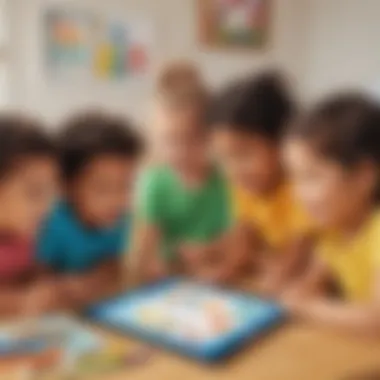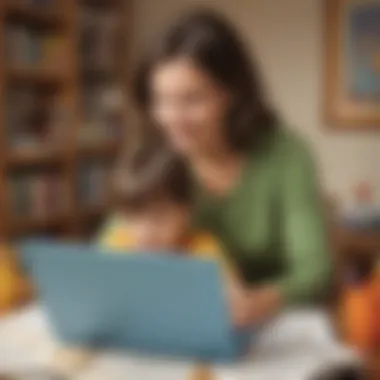Engaging Free Online Activities for Pre-K Kids


Intro
In today's fast-paced world, parents and educators constantly seek ways to engage pre-kindergarten children in learning. The internet offers an array of free online activities tailored to young minds, making early education both fun and accessible. This guide focuses on various resources that not only entertain but also stimulate development in areas like creativity, critical thinking, and early literacy.
Here, we will dive into creative activities, quizzes, and informative articles that will keep little ones engaged while enhancing their educational experience. So, let's get started!
Creative Activities
When it comes to nurturing creativity in children, hands-on activities reign supreme. Creative activities allow children to express themselves, develop fine motor skills, and explore their environment. By tapping into their imagination, kids can learn valuable lessons while creating something unique.
Craft Ideas
Crafting is more than just playing with glue and scissors; it’s a gateway to understanding shapes, colors, and textures. Here are a few simple craft ideas:
- Paper Plate Animals: Transform a regular paper plate into a wild animal using craft supplies at home.
- Nature Collage: Collect leaves and twigs from outdoors. Glue them on paper to make a beautiful collage, discussing colors and shapes as children work.
- DIY Puppets: Use old socks or paper bags to make whimsical puppets that can be used in storytelling.
Step-by-Step Guides
Creating something often requires some guidance, especially for young children. Each of the crafts mentioned comes with easy-to-follow instructions. For instance, for the paper plate animals, the steps are as follows:
- Gather supplies like paper plates, paints, and markers.
- Decide on an animal to create.
- Paint or color the plate according to the animal’s features.
- Add ears, tails, or other fun elements using construction paper.
- Share the finished masterpiece with family.
Educational Value
These activities encourage kids to practice essential skills. As they create, children hone their hand-eye coordination, learn about cause and effect, and express their emotions. Crafting also helps with language development as they learn new vocabulary and storytelling techniques when sharing their creations.
"Creativity is intelligence having fun." - Albert Einstein
Fun Quizzes
After engaging with creative activities, it’s important to assess learning in a way that is enjoyable. Fun quizzes are a great way for kids to reinforce what they've learned without feeling pressured. Platforms like ElemFun provide various quizzes tailored to young learners.
Quiz Topics
The quizzes cover a wide array of subjects, such as:
- Basic Math Skills: Simple addition and subtraction.
- Animal Recognition: Identifying animals and their habitats.
- Shapes and Colors: Understanding and naming different shapes and colors.
Question Types
The quizzes utilize various question formats to keep kids interested:
- Multiple choice questions with colorful pictures.
- Fill-in-the-blank questions that encourage kids to recall vocabulary.
- True or false questions to gauge comprehension.
Knowledge Reinforcement
Participating in quizzes not only tests knowledge but also reinforces learning concepts. By revisiting topics in a fun way, children can strengthen their retention and build confidence in their skills.
Fact-Based Articles
In addition to engaging activities, it’s important for children to have access to reading material that supports their curiosity.
Topics
The fact-based articles available cover a broad spectrum, including:
- Historical figures tailored for children.
- Scientific wonders of the natural world.
- Stories of cultures and traditions from around the globe.
Engaging Content
The articles are designed to hold attention with colorful images, interactive elements, and simple, relatable language. By presenting information in a playful manner, these resources capture children's imaginations while educating them.
Intro to Online Learning for Pre-Kindergarten
In today’s world, where technology is king, online learning for pre-kindergarten children has become more than just a trend; it’s a vital aspect of early education. The digital landscape is brimming with resources that can spark curiosity and boost the learning journey for our little ones. But why is this introduction to online learning significant, you may ask? Let’s dive into some key elements that highlight its importance.
With the rise in accessibility to the internet, families now have an array of tools right at their fingertips. This ease of access opens new doors for pre-k kids to explore various subjects at their own pace. Moreover, the wide range of available materials helps cater to individual learning styles, something that a traditional classroom setting may struggle with. In essence, the digital sphere allows for a personalized approach, creating opportunities for young minds to thrive based on their unique interests.
The Rise of Digital Educational Resources


As we look around, it’s evident that digital educational resources are popping up all around us. Websites, apps, and online platforms dedicated to early childhood education promise engaging content that keeps young learners glued to their screens while learning valuable skills. Whether it’s interactive games that encourage problem-solving or virtual storytime sessions that enhance literacy, the online world is teeming with possibilities.
These resources have been especially pivotal during situations where in-person learning is not feasible. Parents have reported that engaging their young children with digital content has become an integral part of their daily routines. Moreover, many platforms offer free resources, making it easier for families to access high-quality materials without breaking the bank.
Advantages of Online Activities for Young Learners
Online activities carry several significant advantages for pre-kindergarten children. One of the most notable benefits is the interactive nature of these resources. Children are not just passive recipients of information; they actively engage with the content. This interactivity can bolster learning retention by making it a hands-on experience, rather than the traditional memorization techniques.
Another advantage is the ability for children to learn at their own pace. Online resources can accommodate various speed preferences; some children may need more time with certain topics, while others may breeze through them. This flexibility ensures that no child is left behind, and each one can successfully grasp the concepts presented.
Lastly, many online activities build foundational skills such as critical thinking, communication, and collaboration. For instance, some interactive games require kids to work in small groups or communicate their thoughts effectively. This kind of team activity prepares them for future social interactions and larger learning environments they will encounter later on.
"Digital resources provide an engaging platform that not only entertains but also educates our pre-kindergarten children in fun and meaningful ways."
In sum, the introduction to online learning for pre-kindergarten is not merely an option; it’s a necessity in our tech-centric world. The various digital educational resources and the numerous advantages they offer provide the foundation for effective and engaging early childhood education.
Types of Free Online Pre-K Activities
Exploring various types of free online activities is crucial for engaging pre-kindergarten children in meaningful ways. These activities do not just serve as entertainment; they foster critical skills that are foundational for their development. The digital landscape is rich with resources that can enhance learning through play, creativity, and interaction. Each type of activity serves a unique purpose, from helping children grasp basic concepts to honing their social skills. Let's delve into some notable categories that can transform screen time into productive learning experiences.
Interactive Learning Games
Interactive learning games are a fantastic way to capture the attention of young learners while teaching them vital skills. They blend fun with education, allowing children to explore numeracy, literacy, and problem-solving in a playful environment. These games often include bright visuals and captivating sound effects that keep kids engaged.
Through these platforms, children can practice counting, learn letters, or even experiment with colors—all while they think they are merely playing. This approach can subtly reinforce concepts children have been introduced to in more traditional formats. Moreover, many games also include various difficulty levels, meaning kids can advance at their own pace.
"Games that inspire learning can motivate children to engage more deeply with educational content."
Here are a few key benefits of interactive learning games:
- Develops hand-eye coordination
- Enhances critical thinking skills
- Fosters a love for learning
Virtual Storytime and Reading Activities
Virtual storytime and reading activities open doors to a world of imagination and creativity. These sessions can instill a love for books from a young age, encouraging children to express their thoughts and engage with stories. Many online platforms provide read-aloud options where storytellers bring characters to life through engaging narration and animated illustrations.
Apps like Storyline Online and various YouTube channels present a plethora of stories, catering to different tastes and interests. Kids can listen to stories while following along with the visuals, enhancing comprehension skills. This kind of exposure builds vocabulary and exposes young minds to various narrative structures.
- Encourages active listening
- Develops imaginative thinking
- Promotes early literacy skills
Educational Videos and Songs
Educational videos and songs deliver rich content in a format that resonates with young audiences. With colors, movement, and catchy tunes, thrilling learning experiences await. Young children often find songs and videos much easier to absorb than traditional learning methods. These formats provide a multisensory experience that can help consolidate knowledge and reinforce concepts like the alphabet or simple math.
Popular platforms such as PBS Kids or Sesame Street offer an array of content that features beloved characters teaching valuable lessons through catchy songs and entertaining narratives. Kids are often drawn to these familiar figures, making learning a joyful experience.
Key benefits include:
- Reinforcement of learning through music and visuals
- Improved language retention
- Development of rhythm and coordination
Printable Worksheets and Craft Ideas
Printable worksheets and craft ideas complement online learning by offering hands-on activities that engage children away from screens. These resources allow parents to bridge the gap between digital learning and physical engagement. Working on worksheets helps improve fine motor skills, while craft activities encourage creativity and self-expression.
Websites like Education.com or Teachers Pay Teachers provide numerous free worksheets tailored for various skills, from math to art. Craft ideas can include simple activities like coloring or more elaborate projects involving common household materials. These physical tasks help solidify the concepts kids learn through online resources.
Consider these advantages:
- Enhances fine motor skills through coloring or cutting
- Encourages creativity through crafts
- Visually reinforces learning through completed worksheets
By leveraging these diverse types of online activities, parents and educators can create a rich learning environment that addresses various aspects of early childhood development, ensuring that children thrive and grow in a supportive and engaging way.
Benefits of Free Online Activities
In today’s fast-paced world, especially for our littlest learners, free online activities hold a treasure trove of benefits. They not only make learning accessible but also engage young minds in effective ways. Let’s unpack the key advantages of these resources and how they can positively influence pre-kindergarten children.
Enhancing Cognitive Skills
This aspect can’t be overstated. Online activities are designed to stimulate children’s thinking, problem-solving, and memory skills. For instance, interactive games that challenge kids to solve puzzles or match colors can boost their analytical and critical thinking capabilities. When children play these games, they are not just having fun; they are also bypassing hurdles that enhance their ability to retain information.


Key cognitive benefits include:
- Improved memory: Engaging with online tasks enhances recall as little ones learn to associate responses with visuals and sounds.
- Critical thinking development: Many activities require children to make choices, fostering their decision-making abilities at an early age.
- Pattern recognition: Games that involve shapes or sequences help young learners recognize and predict patterns, which is crucial for math skills.
The captivating nature of these online activities pulls kids into a realm of learning that feels more like a game than a chore. Hence, they can cultivate a love for learning that paves the way for future academic success.
Encouraging Social Interaction
Online activities also provide unique opportunities for children to connect with peers. Participating in virtual storytimes or collaborative learning games enables a form of social interaction that many young kids might miss out on otherwise. While these interactions might seem limited to screens, they often lead to deeper conversations and shared experiences among participants.
Advantages of social interaction through online platforms include:
- Teamwork skills: Many activities encourage sharing and cooperation, laying the groundwork for teamwork skills.
- Communication enhancements: Kids learn to express themselves clearly and listen to others, even through a digital medium.
- Cultural exposure: Virtual events can gather children from different backgrounds, broadening their understanding and appreciation of diversity.
In this regard, free online activities serve not just as learning tools but as bridges connecting young learners to their peers in meaningful ways.
Promoting Independence and Self-Directed Learning
Asking kids to manage their own learning experience can be a game changer. With free online activities, pre-kindergarteners can explore at their own pace. This independence fosters a sense of responsibility towards their own education. They learn to navigate websites, choose activities that intrigue them, and even troubleshoot small issues all on their own.
Benefits of fostering independence include:
- Motivation to learn: Children often feel proud when they master a skill on their own, sparking further interest.
- Goal-setting instincts: Engaging in online platforms allows kids to set personal learning goals, a skill crucial for lifelong learning.
- Self-regulation: This independence also teaches them to manage their time and attention, valuable skills for school and later in life.
The scaffolding provided by these online resources aids young learners in gaining confidence in their abilities, making them more willing to explore and learn independently.
"Children learn more through discovery than didactic teaching approaches. Free online activities empower them to be active participants in their education."
How to Find Quality Free Resources
In today’s digital age, the abundance of online materials can be overwhelming, to say the least. For parents and educators searching for free online activities for pre-kindergarten children, it’s crucial to sift through this vast sea of resources to find those that genuinely enhance learning. Understanding how to locate high-quality free resources not only saves time but also ensures that young learners are engaging with effective educational content.
Evaluating Online Platforms
When on the hunt for valuable online pre-K resources, evaluating the platforms you encounter is vital. Look for platforms that are user-friendly, as this can hugely impact a child's learning experience and the parent's ease of use. Here are a few key pointers to consider:
- Content Quality: Focus on platforms offering content developed or reviewed by early childhood education professionals. Materials should be engaging, educational, and age-appropriate.
- Interactive Elements: Online activities should often incorporate interactivity, allowing children to engage actively rather than being passive consumers. Look for platforms that incorporate games or quizzes to keep kids intrigued.
- User Reviews: Feedback from other users can be a treasure trove of information. Often, parents will share their firsthand experiences—both positive and negative—about a particular resource.
- Access Levels: Make sure the resources are accessible without hidden fees or subscription requirements. Free resources should be truly free to utilize, without any strings attached.
A good practice is to explore a few options and see which platforms resonate best with your child’s learning style. A sense of adventure can often lead you to some hidden gems.
Recommended Websites for Pre-Kindergarten Activities
Once you know how to evaluate resources, it helps to have some systems in mind. Here’s a rundown of some stand-out websites that offer fantastic, relevant online activities for pre-kindergarten kids:
- PBS Kids (pbskids.org)
Known for its educational games that feature beloved characters from PBS shows. It’s age-appropriate, fun, and quite beneficial. - Starfall (starfall.com)
This site focuses on early literacy skills with engaging lessons. It’s interactive and provides an excellent foundation for phonics and reading. - ABCmouse (abcmouse.com)
While ABCmouse has paid options, they frequently offer free trial periods. It delivers comprehensive learning paths covering multiple subjects. - Storyline Online (storylineonline.net)
Children can listen to stories read by famous actors. It’s a great way to promote listening skills and literacy while enjoying a good story.
These websites present a variety of activities that are both entertaining and educational, making learning a delightful experience for pre-kindergarten children.
When seeking online resources, remember: not all that glitters is gold. Seek out those platforms that prioritize quality and engagement over quantity.
Tips for Parents and Educators
Involving pre-kindergarten children in online activities not only enriches their learning experience but also demands attention from parents and educators. It's essential to understand that navigating the digital landscape can be quite a challenge for young learners. That's where effective guidance comes in. By helping the children explore these resources, parents and educators can make the most of the online tools available to foster a productive and enjoyable learning environment. Here’s what to consider:
Setting Up a Learning Environment at Home
Creating an effective learning environment at home is akin to setting the right stage for a play; the atmosphere influences performance. A well-organized space can lead to better focus and comprehension. Here are some specific elements to keep in mind:
- Designate a Spot: Choose an area in your home that is quiet and free of distractions like television or loud siblings. This doesn't have to be a full room, just a cozy corner with a small table and chair.
- Age-Appropriate Resources: Ensure that the materials and tools available are suitable for their age. Bright colors, interesting textures, and fun shapes can be appealing to young children. Kids often respond better to visual stimuli.
- Tech Savvy Setup: Familiarize yourself with the devices they will use. Ensure that tablets or computers have the appropriate settings, like brightness and volume, adjusted to fit your child’s needs.
- Regular Organization: Kids thrive in tidy spaces. Organize books, toys, and educational materials where kids can access them easily. This encourages independent exploration, fostering curiosity.
The success of online activities often rests on such foundational aspects, ensuring children can engage fully and safely.
Balancing Screen Time with Physical Activities
It’s no secret that too much screen time can lead to various issues like decreased attention spans or even physical discomfort. Striking a balance between online learning and physical activity is crucial. Here’s a guide:
- Set Timers: Implement time limits on screen usage. For instance, after 30 minutes of activities online, plan a 15-minute break for stretching or simple exercises.
- Incorporate Movement Games: Blend learning with physical activity by using awesome resources that have dancing or movement as part of their programs. Websites with interactive games often provide options that get kids moving.
- Outdoor Play: After online learning, encourage outdoor play. Activities like running, jumping, or just a simple walk can refresh their minds and bodies. Nature has its own way of invigorating and inspiring creativity.
- Family Participation: Join in on the fun! Kids might enjoy online activities more if parents or siblings participate as well. This not only fosters learning but also creates cherished experiences, encouraging a supportive learning atmosphere at home.
Remember: The goal is to create a holistic learning approach that intertwines digital and physical realms, helping young learners thrive amidst this digital age.


So parents and educators, by setting up a tailored learning environment and ensuring balanced screen time, you are laying down the essentials for young, impressionable minds to flourish. This guidance will not only nurture their educational growth but also support their overall well-being.
Potential Challenges of Online Learning
In an era where digital learning tools are widely adopted, understanding the challenges associated with online activities for pre-kindergarten children becomes essential. While there are many advantages to online learning, it's equally vital to consider potential barriers that hinder optimal learning experiences. These challenges can affect not just the children, but also parents and educators who strive to make the most of available resources. By preparing for these issues, families can address them head-on, ensuring that online learning becomes a positive experience rather than a point of frustration.
Screen Fatigue and Attention Span Issues
One prominent concern when children engage with screen-based activities is the phenomenon often dubbed "screen fatigue." Young minds, while curious and eager, can quickly become overwhelmed when exposed to fast-paced visuals or prolonged content. When a child stares at a screen for too long, it can lead to reduced focus, irritability, and a general sense of exhaustion.
To mitigate this, it’s advisable to –
- Set time limits for online activities. Keeping sessions short and sweet helps maintain engagement.
- Encourage breaks. Simple stretching or moving away from the screen for a few minutes can restore energy.
- Choose interactive content. Activities that require physical movement, even virtually, can keep kids interested without inducing fatigue.
Here’s a friendly reminder: sometimes, a little distraction can help refocus attention. A quick song or a fun dance break can work wonders in refreshing a child’s energy.
Limited Access for Some Families
While the internet is a treasure trove of educational opportunities, access isn’t uniform across all households. Some families may experience challenges due to limited internet connectivity or lack of devices. These barriers can create educational disparities, leaving some children behind while others gain an upper hand in their learning journey.
To combat this issue, communities can –
- Advocate for better internet access. Initiatives to improve connectivity can significantly change a child’s learning experience.
- Share resources. Educators can guide families toward offline activities or printable resources that don’t require online access.
- Foster a supportive network. Parents can come together to share devices while scheduling online learning sessions, ensuring that every child gets the chance to participate.
It's essential for stakeholders to recognize these challenges, as they can impact a child’s learning trajectory. Building a framework that promotes accessibility is crucial for leveling the playing field.
"Navigating the world of online learning requires understanding both opportunities and challenges. Only by recognizing potential pitfalls can we truly enhance the pre-kindergarten experience."
By addressing the issues of screen fatigue and accessibility head-on, caregivers can create a balanced approach, ensuring that online learning benefits all pre-kindergarten children.
Future Trends in Online Pre-K Education
As the world shifts increasingly towards digital spheres, the future of online pre-kindergarten education stands at an intriguing crossroads. Understanding current trends is vital for parents and educators who aim to arm young learners with essential skills and knowledge in the most effective ways. With technology constantly evolving, it is not just about keeping up, but about leveraging these advancements to build a robust foundation for early education.
Incorporating AI and Personalized Learning
Artificial intelligence is changing the game in many sectors and education is no exception. The incorporation of AI in online pre-K education presents a golden opportunity to tailor the learning experience to individual needs. Adaptive learning systems, for example, can analyze a child’s strengths and weaknesses, adjusting the curriculum to fit their unique learning pace.
- Imagine a virtual reading buddy that assesses fluency and comprehension in real-time, providing customized feedback. This immediacy helps children grasp concepts as they learn, rather than waiting for traditional reviews. Parents can rest easy knowing their little one is engaged in learning that suits them best.
Furthermore, AI enhances interactivity, drawing children into a rich learning environment where they feel supported. Children's curiosity can be piqued with interactive stories seeming to come alive, boosting engagement like never before.
Unfortunately, over-reliance on technology can lead to a lack of crucial face-to-face interactions. Thus, balance is key. Parents must ensure that while children learn through personalized tools, they also engage in traditional play and social experiences.
Innovative Ideas for Gamification in Learning
Gamification is all the rage these days, and for good reason. It effectively combines play and education, which is ideal for pre-K learners. Simply put, it makes the learning process fun. When children can earn stars or badges for completing tasks, their motivation skyrockets.
Gamified elements can take many forms, such as:
- Interactive games that incorporate math or language skills. Each achievement unlocks a new level, keeping kids wanting more.
- Story-based quests, where the child navigates a plot while completing educational puzzles along the way.
- Challenges and competitions among peers that encourage collaboration and friendly rivalry. This fosters not only learning but important social skills.
Moreover, this trend resonates strongly with today’s youth, who are naturally drawn to technology and gaming. The challenge lies in ensuring that these games are educationally sound and not just for entertainment. In this regard, it’s essential to thread educational objectives into the fabric of every game, ensuring that they nurture cognitive and social skills.
"With the right mix of play and learning, gamification can lead to a richer educational experience that children will look forward to each day."
Closure
As we conclude our exploration of free online activities designed for pre-kindergarten children, it's vital to acknowledge the significance of adaptable and varied learning approaches. In today’s digital age, technology serves as a crucial tool that enhances the educational experience for young learners. By tapping into a wide range of online resources, we empower children to engage in a manner that resonates with their individual interests, needs, and learning styles.
The Importance of Diverse Learning Approaches
The formative years of childhood are an essential time for development, and incorporating diverse learning methods is priceless. Each child is unique, much like a snowflake, and what clicks for one may not work for another. A wide array of activities—from interactive games to storytelling videos—can cater to different learning preferences. Some may thrive in a hands-on environment, while others might soak up information better through songs or visuals. By mixing it up, we help children to become well-rounded learners.
Moreover, variety stimulates curiosity. Think of it like offering a buffet instead of a single dish. When all the learning modalities are at their fingertips, children are more likely to experiment and venture into areas they might not usually explore. This adaptability can lead to higher engagement and retention of knowledge, building a stronger foundation for future learning.
Encouraging Lifelong Learning Habits
Another crucial aspect to underline is that today’s actions set the stage for tomorrow’s attitudes. Helping children to develop a habit of learning early on can imbed attitudes towards knowledge that stay with them for life. When pre-kindergarten children enjoy the educational activities they engage with, they start to associate learning with fun. This sets a positive life-long attitude toward education—a crucial life skill in our rapidly changing world.
As parents and educators, we have the unique opportunity to nurture a love for learning through these activities. When children actively participate in their education, they develop critical thinking skills and the resilience to tackle challenges head-on. They learn that learning isn't just about getting the right answers; it's about the journey, the mistakes, and the growth that comes from it.
Ultimately, we stand to gain a generation of learners who view knowledge as something to be cherished rather than dreaded. Let's pave the way for them!
"Learning is not the product of teaching. Learning is the product of the activity of learners." - John Holt
In summary, the importance of embracing diverse learning approaches and fostering lifelong habits cannot be overstated. By embracing these ideas, we equip our children to navigate the complexities of tomorrow's world with confidence and curiosity.







